- Home›
- Healthy Living›
- 11 Health Benefits Of Pine Nuts And Side Effects
11 Health Benefits Of Pine Nuts And Side Effects
By: Priyanka Maheshwari Sun, 23 July 2023 11:24:49
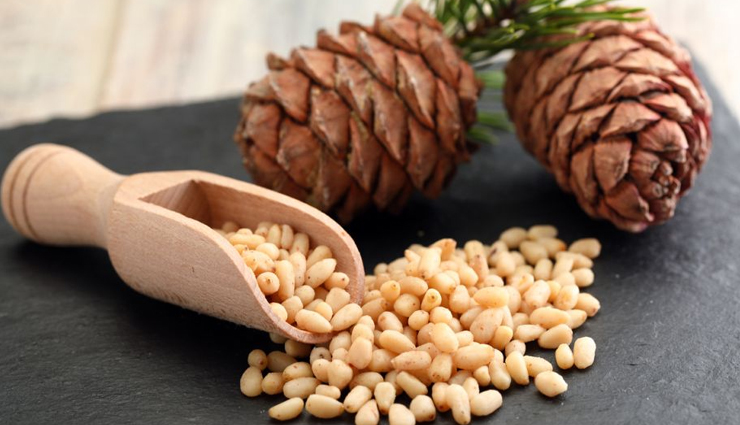
Pine nuts, also known as pignoli or pinon nuts, are the edible seeds of pine trees and have been enjoyed as a nutritious and delicious food for centuries. These small, ivory-colored seeds have found their way into various cuisines across the globe, adding a delightful crunch and subtle nutty flavor to dishes. Beyond their culinary appeal, pine nuts boast an impressive array of health benefits that contribute to overall well-being.
In this article, we will explore the numerous health benefits of pine nuts, from their rich nutrient profile to their potential positive effects on heart health, weight management, and more. So, let's delve into the world of pine nuts and discover why these tiny seeds pack a mighty nutritional punch.
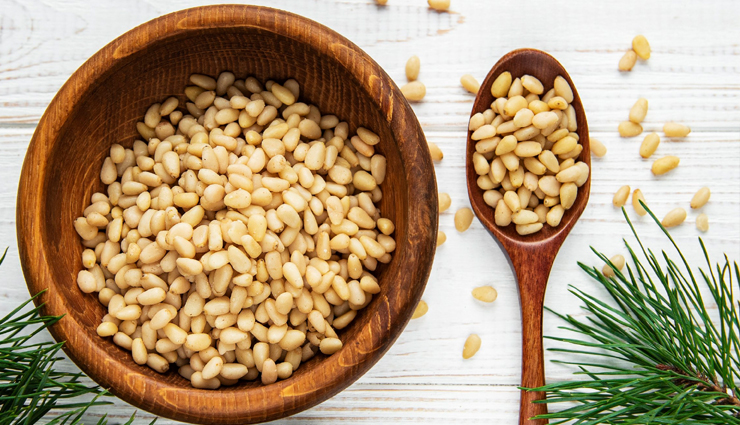
What Are Pine Nuts?
Pine nuts are the edible seeds of pine trees, belonging to the family Pinaceae. These small, elongated seeds are enclosed within the protective outer shell of pine cones. When the pine cones mature and open, the seeds are released, and they are then harvested for consumption.
Pine nuts are typically harvested from several pine tree species, with the stone pine (Pinus pinea) and the Korean pine (Pinus koraiensis) being the most commonly used for commercial purposes. The stone pine, also known as the Mediterranean pine or Italian stone pine, is particularly well-known for producing large, sweet, and creamy pine nuts.
These ivory-colored seeds have a delicate texture and a subtle, nutty flavor. Due to their versatility and unique taste, pine nuts are commonly used in various culinary dishes, especially in Mediterranean, Middle Eastern, and Asian cuisines. They are often toasted to enhance their flavor and can be used as a topping in salads, incorporated into pasta dishes, sprinkled on roasted vegetables, or used as an essential ingredient in traditional pesto sauce.
Pine nuts are not only cherished for their culinary uses but are also appreciated for their rich nutritional content. They are a source of healthy fats, protein, vitamins, and minerals, making them a nutritious addition to a balanced diet. However, it's important to note that pine nuts can be relatively expensive compared to other nuts due to the labor-intensive process of harvesting them from pine cones.
Despite their small size, pine nuts pack a mighty nutritional punch, and in the following sections, we will explore the various health benefits they offer and why they have been valued for their nourishing properties for centuries.
What Is The History Of Pine Nuts?
The history of pine nuts dates back thousands of years and is intertwined with the culinary and cultural heritage of various civilizations. Pine nuts have been valued as a nutritious food source and have played a significant role in the diets of indigenous communities and ancient cultures around the world.
Early records suggest that pine nuts were first consumed by indigenous peoples in North America, Asia, and Europe. Native American tribes in regions like the Great Basin and the Southwest United States, as well as First Nations in Canada, incorporated pine nuts into their traditional diets. These communities collected pine nuts from local pine tree species and utilized them as a valuable food source, either consuming them raw or roasted.
In ancient history, pine nuts held an essential place in the diets of Mediterranean civilizations. The stone pine (Pinus pinea) species, native to Southern Europe and the Mediterranean region, was particularly prized for its large and sweet pine nuts. Historical records show that the ancient Greeks and Romans enjoyed pine nuts, using them in various dishes and desserts.
In addition to being a dietary staple, pine nuts also held cultural significance. In Native American communities, the harvesting of pine nuts was often celebrated with special gatherings and rituals. In ancient Rome, pine nuts were considered a symbol of fertility and were used in various religious ceremonies.
Pine nuts continued to be popular through the Middle Ages and the Renaissance, featuring prominently in medieval European recipes and culinary traditions. They were also traded along the ancient Silk Road, spreading their popularity across Asia and the Middle East.
In modern times, pine nuts have retained their culinary importance and continue to be a cherished ingredient in various regional cuisines. Their use extends to dishes such as salads, sauces, desserts, and pastries. With growing awareness of their nutritional benefits, pine nuts have also become a sought-after ingredient in health-conscious diets.
However, due to the labor-intensive process of harvesting and the relatively low yield of pine nuts from pine cones, they are considered a delicacy and can be relatively expensive compared to other nuts.
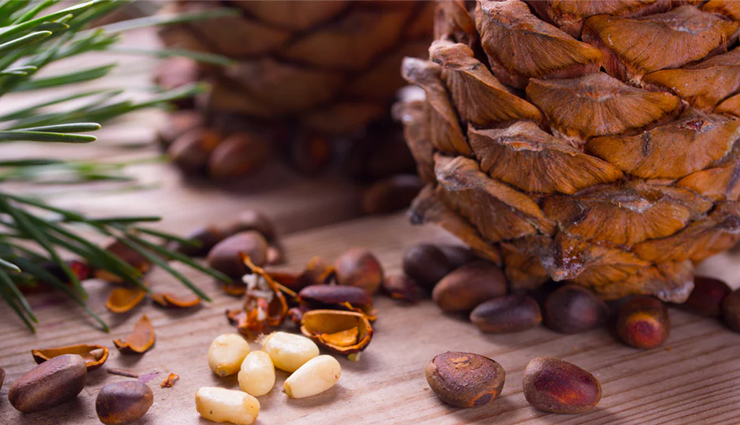
What Is The Nutritional Profile Of Pine Nuts?
Pine nuts are not only delicious but also boast an impressive nutritional profile. Despite their small size, they are packed with essential nutrients that contribute to a healthy and balanced diet. Here is the approximate nutritional profile of pine nuts per 100 grams:
Calories: 673 kcal
Protein: 13.7 grams
Carbohydrates: 13.1 grams
Fiber: 3.7 grams
Fat: 68.4 grams
Saturated Fat: 4.9 grams
Monounsaturated Fat: 18.7 grams
Polyunsaturated Fat: 34.1 grams
Cholesterol: 0 milligrams
Vitamin E: 9.3 milligrams (46% of the Daily Value)
Vitamin K: 53.9 micrograms (68% of the Daily Value)
Thiamine (Vitamin B1): 0.4 milligrams (28% of the Daily Value)
Riboflavin (Vitamin B2): 0.2 milligrams (13% of the Daily Value)
Niacin (Vitamin B3): 4.4 milligrams (22% of the Daily Value)
Vitamin B6: 0.1 milligrams (6% of the Daily Value)
Folate (Vitamin B9): 34 micrograms (9% of the Daily Value)
Calcium: 16 milligrams (2% of the Daily Value)
Iron: 5.5 milligrams (31% of the Daily Value)
Magnesium: 251 milligrams (63% of the Daily Value)
Phosphorus: 575 milligrams (58% of the Daily Value)
Potassium: 597 milligrams (17% of the Daily Value)
Zinc: 6.4 milligrams (43% of the Daily Value)
Copper: 1.3 milligrams (64% of the Daily Value)
Manganese: 8.8 milligrams (440% of the Daily Value)
Selenium: 34.1 micrograms (49% of the Daily Value)
Pine nuts are a rich source of healthy fats, primarily monounsaturated and polyunsaturated fats, including omega-6 fatty acids. They are particularly high in pinolenic acid, a unique fatty acid found in pine nuts, which has been associated with various health benefits, including appetite suppression.
Additionally, pine nuts are a good source of essential minerals such as magnesium, phosphorus, copper, manganese, and zinc, all of which are important for various bodily functions, including bone health, energy production, and antioxidant activity.
Moreover, pine nuts are abundant in vitamin E, an antioxidant that helps protect cells from oxidative damage, and vitamin K, which plays a crucial role in blood clotting and bone health.
Health Benefits Of Pine Nuts
Pine nuts, the small and delectable seeds of pine trees, offer a range of health benefits that make them a valuable addition to any diet. Here are 10 health benefits of pine nuts:
# Rich in Nutrients
Pine nuts are packed with essential nutrients, including healthy fats, protein, vitamins (such as vitamin E and vitamin K), and minerals (such as magnesium, manganese, and zinc).
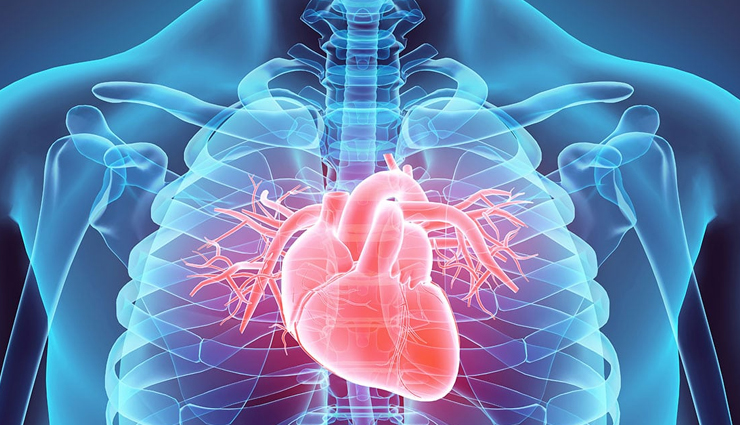
# Heart Health
The monounsaturated and polyunsaturated fats in pine nuts, along with their high levels of pinolenic acid, have been linked to improved heart health by reducing bad cholesterol levels and promoting overall cardiovascular well-being.

# Weight Management
Pine nuts are known for their appetite-suppressing properties, particularly due to the presence of pinolenic acid. Including pine nuts in your diet may help control cravings and support weight management efforts.

# Antioxidant Properties
Pine nuts are rich in antioxidants, such as vitamin E, which help protect the body's cells from damage caused by harmful free radicals, thus promoting overall health and reducing the risk of chronic diseases.

# Bone Health
The high content of essential minerals like magnesium, manganese, and phosphorus in pine nuts contributes to maintaining strong and healthy bones, supporting bone density and preventing conditions like osteoporosis.

# Energy Boost
With their high-calorie content and healthy fats, pine nuts provide a quick and sustained energy source, making them an excellent addition to a pre-workout snack or for combatting fatigue.
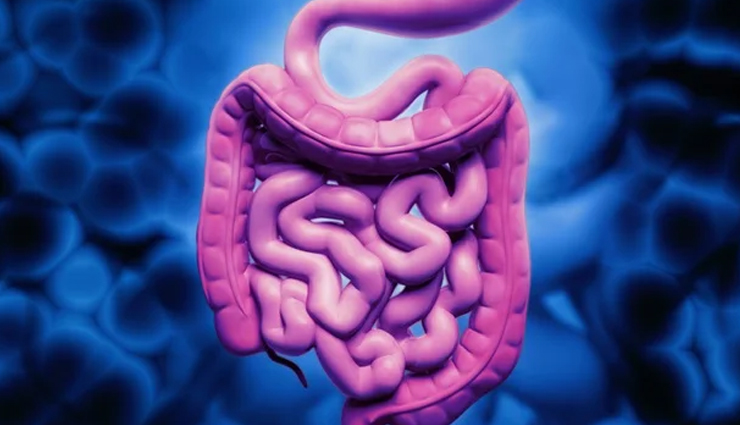
# Improved Digestion
The fiber content in pine nuts aids in promoting healthy digestion, preventing constipation, and supporting a well-functioning gastrointestinal system.

# Brain Health
The combination of various nutrients, such as vitamin E, manganese, and copper, contribute to brain health by supporting cognitive function and protecting against age-related cognitive decline.

# Skin and Hair Health
The antioxidants in pine nuts help protect the skin from oxidative stress and premature aging, while the healthy fats contribute to maintaining lustrous hair and healthy skin.
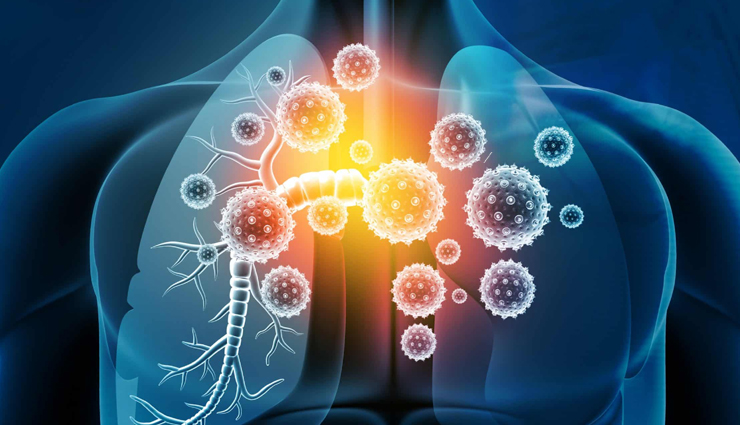
# Immune Support
The rich nutritional content of pine nuts, including vitamins and minerals, supports a robust immune system, helping the body fend off infections and diseases.

Are Pine Nuts Good During Pregnancy?
Yes, pine nuts can be a nutritious and safe addition to the diet during pregnancy, provided they are consumed in moderation and as part of a balanced and varied diet. Pine nuts offer several essential nutrients that can be beneficial for both the mother and the developing baby.
Here are some reasons why pine nuts can be good during pregnancy:
Rich in Nutrients: Pine nuts are a good source of various nutrients, including healthy fats, protein, vitamins (such as vitamin E and vitamin K), and minerals (such as magnesium, manganese, and zinc). These nutrients play a crucial role in supporting overall health and fetal development.
Omega-6 Fatty Acids: Pine nuts are a source of omega-6 fatty acids, which are essential for the development of the baby's brain and eyes.
Energy Boost: During pregnancy, the body requires additional energy to support the growing baby. Pine nuts, with their high-calorie content and healthy fats, can provide a quick and sustained energy source.
Heart Health: The monounsaturated and polyunsaturated fats in pine nuts can help support heart health during pregnancy.
Protein: Pine nuts are a source of protein, which is essential for the growth and development of the baby's tissues and organs.
Antioxidants: The antioxidants in pine nuts, such as vitamin E, help protect the body's cells from oxidative stress, which is especially important during pregnancy.
Bone Health: The minerals in pine nuts, such as magnesium and manganese, are vital for maintaining strong bones and teeth, both for the mother and the developing baby.
Digestive Health: The fiber content in pine nuts can help prevent constipation, which is a common issue during pregnancy.

Side Effects Of Pine Nuts?
While pine nuts are generally safe and nutritious for most people, some individuals may experience side effects or allergic reactions. Here are some potential side effects of consuming pine nuts:
Allergic Reactions: Some people may be allergic to pine nuts, and consuming them can trigger allergic symptoms. Allergic reactions to pine nuts can vary in severity and may include symptoms such as itching, hives, swelling of the lips or throat, difficulty breathing, and anaphylaxis (a severe and potentially life-threatening reaction).
Pine Mouth Syndrome: Pine mouth syndrome, also known as "pine nut mouth" or "pine nut syndrome," is a rare and temporary condition that can occur after eating certain types of pine nuts, particularly those from the species Pinus armandii. It is characterized by a bitter or metallic taste that can last for several days to weeks. The exact cause of this syndrome is not fully understood, but it is believed to be related to specific pine nut varieties and individual sensitivities.
High Calorie Content: Pine nuts are calorie-dense due to their high fat content. Overconsumption of pine nuts can lead to excessive calorie intake, which may contribute to weight gain if not balanced with overall dietary habits.
Digestive Issues: Eating large quantities of pine nuts in a short period may cause digestive discomfort in some individuals, such as bloating, gas, or stomach upset.
Potential Contamination: Like any food product, pine nuts can be at risk of contamination, such as with mold or pathogens. It's essential to store pine nuts properly and purchase them from reputable sources to minimize this risk.





